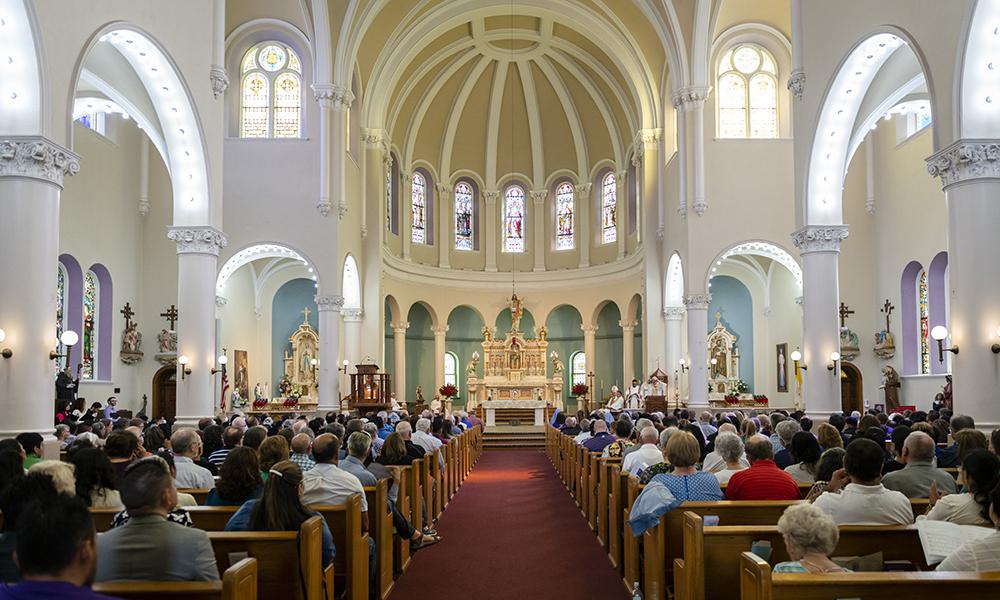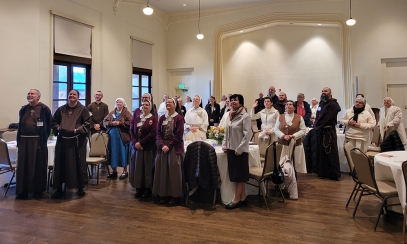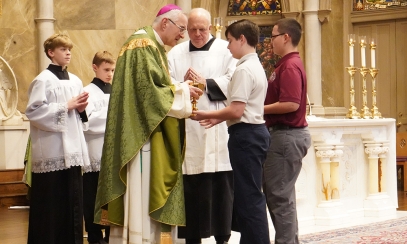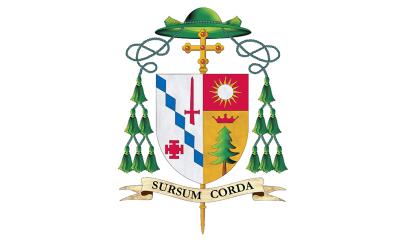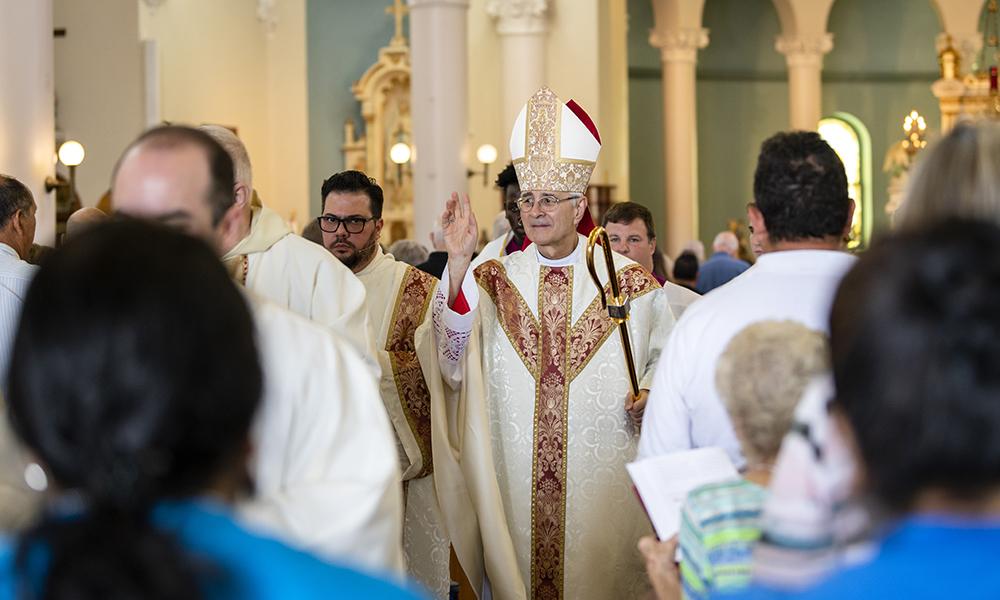
‘Liturgy doesn’t happen by accident’
Bishop Raica Opens Day of Liturgical Formation With Mass
Bishop Raica Opens Day of Liturgical Formation With Mass
On Aug. 20, Bishop Raica celebrated Mass at Sacred Heart of Jesus Catholic Church in Cullman, opening the Diocesan Liturgical Formation Day for lectors, extraordinary ministers of Holy Communion, and liturgical musicians. The complete text of his homily follows herein.
On Aug. 20, Bishop Raica celebrated Mass at Sacred Heart of Jesus Catholic Church in Cullman, opening the Diocesan Liturgical Formation Day for lectors, extraordinary ministers of Holy Communion, and liturgical musicians. The complete text of his homily follows herein.
Dear friends, thank you for this great opportunity to be with you this morning. It’s my understanding that this liturgical formation event is full. I am so grateful for your “yes” to help in your parishes and institutions. Our liturgy doesn’t happen by accident. No! It takes an understanding to help us formulate a response to God that is our very best and gives God all honor, glory, praise, and adoration.
The word liturgy is derived from the Greek which means work of the people. But it is not solely the work of the people because we are doing heavenly and divine things. Above all, it is captured by one of the Prefaces which says, in so many words, “You [God] have no need of our praise, yet our desire to thank You is itself Your gift!” We cannot bring about our salvation on our own. We lack the capacity and power to do so. But we can cooperate with it – to appreciate it and reflect upon it.
Here is how I reflect on it today: The liturgy is divided in a couple different parts. In its broader context, we might call it four main parts in which we all have some participation.
1) The Gathering - We come from our homes, our cottages, our hotels, or the places we are visiting or just pop in off the street – we come together. The many become one – a sort of E pluribus unum. We become one people, and after our gathering, our initial preparations in prayer or focusing our minds and hearts, we join in the entrance hymn or antiphon in which we formally become one people giving praise.
2) The Liturgy of the Word - The reading from Sacred Scripture that sets the stage for our reflection – God speaking to us. We adopt a posture of listening and responding. Listening to the reading proclaimed and responding with an antiphon. The Gospel is heralded by the alleluia or other acclamation in Lent and the Good News is joyfully proclaimed. We contemplate it by the words of the homilist who helps us focus on one aspect or seeks to bring all the readings into focus as one coherent thought or message concluding with what we need for our church, state, the sick, the dying, and other important needs of the local community.
3) The Liturgy of the Eucharist - We do what the Lord did – in preparing the altar and offering the bread and wine that are, through the prayer of the priest, transfigured into the Body, Blood, Soul, and Divinity of Christ. It is His Sacrifice on calvary made present so we can participate in it like Mary and John standing beneath the cross. Then, for those prepared, we step forward to receive His Body and Blood. It’s our altar call, our “yes,” our “amen” to what has taken place.
4) The Sending Forth - Having communed, we are then sent out to the world in the dismissal rite – “Go, to love and serve the Lord!” We are sent to our homes, our workplaces, our cities and villages, the highways and byways, to be a Christ that is infiltrating the world with the Good News. At the same time, others are deputed to bring this Body and Blood of Christ to our sisters and brothers who are absent – those in hospital, nursing homes, at home, incarcerated, etc., who are part of our larger faith community. We are all knit together by the bond of our faith. Livestream helps to bring others who cannot make it into our sphere of community.
The prophet Ezekiel in today’s reading describes a very privileged moment. Led by an angel, he describes a vision of being led into the temple – the place of encounter with the Almighty God. He describes how he is brought to the inner court and sees the court filled with the glory of the Lord. He further narrates how He will dwell among the children of Israel. It’s very similar to coming into the church, into the sanctuary where we come face to face with our Lord – who also promises to remain with us through this privileged sacrament. As we said in our responsorial: “The glory of the Lord will dwell in our land.” The Gospel reminds us to be coherent in our lives. It is more than saying one thing and doing another. No, the two must align, and that takes a long time. “For they preach but they do not practice.” This is the great fear I have as a Christian, that I say something or do something that doesn’t align with my Christian faith! Thank God, we have the sacrament of penance and spiritual direction to guide us on this journey we make once in a lifetime. It gives us the guiderails to keep us on track, so we know who our rabbi, our teacher and master is.
My dear sisters and brothers, we do this work together by keeping our eyes and hearts fixed on Jesus.
Finally, it is fitting that we celebrate here in Cullman today – the feast of St. Bernard who pursued Christian virtue. Speaking about this very special relationship with God – who is love – he observes: “Of all the movements, sensations, and feelings of the soul, love is the only one in which the creature can respond to the Creator and make some sort of similar return, however unequal though it be.”
Today, our celebration of Holy Mass is guided by this moment in which we prepare ourselves for the sacredness of the moment that we experience in all humility the making present once again the saving event of Christ! May God bless you all!
For more information about the formation day, click here.

